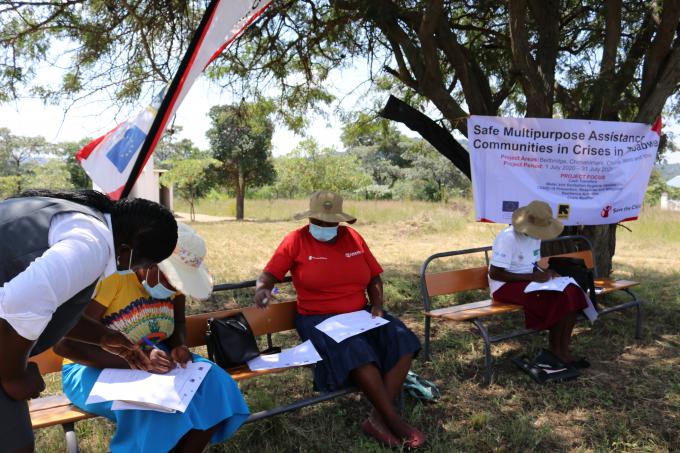Village Health Workers hail COVID-19 trainings
Village Health Workers (VHWs) continue to play a key role in strengthening health systems in Zimbabwe. To build up their capacity to raise awareness on COVID-19 in their communities, Save the Children in partnership with the Ministry of Health and Child Care have been conducting COVID-19 trainings for VHWs in Matobo, Beitbridge, Mbire, Chimanimani and Chipinge districts of Zimbabwe. This is part of COVID-19 prevention, response and mitigation activities under the ECHO funded Safe Multipurpose Assistance to Communities in Crises (SMACC) project being implemented by Save the Children and International Rescue Committee in five districts of Zimbabwe.
Sinqobangani, a Village Health Worker for Tombe village in Matobo district shares how the trainings enabled her to educate communities on COVID-19: “The knowledge I gained enabled me to conduct door to door visits teaching people about COVID-19. I encouraged my community to make tippy-taps (home-made hand-washing facility) for use at their homes, avoid handshakes, make masks and wear them whenever they leave the house.”
“I reached about 60 households. However, when I conducted visits two weeks later, I noticed that most hand washing facilities at homesteads had been removed- but I encouraged them to make new ones” Angeline, VHW for Silozwana village in Matobo said she finds the trainings essential for understanding what the pandemic is, how it is transmitted, how it is prevented. She added that she has been working round the clock to ensure her community is safe: “I attend funerals in my village, monitoring that all mourners wash hands, wear masks properly, and are social distancing. I recently attended and supported two funerals in my village.The first funeral had about 40 people and the second funeral had 45 people.”
Continued training critical in fighting COVID-19.
For Angela Ndlovu the Environmental Health Worker for Silozwe Clinic in Matobo district, training VHWs on COVID-19 is critical as they work hand in hand with the clinic, interacting with the community on a daily basis.
“Village Health workers are the clinic’s eye in the community. These refresher trainings enable them to support the clinic fully as they are equipped with knowledge. We cannot fight the pandemic on our own. During refresher trainings, VHWs meet and give each other feedback on the work they have been doing since the last training, share the challenges faced, the strengths, as well as the achievements.”
 Zimbabwe
Zimbabwe 